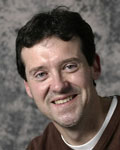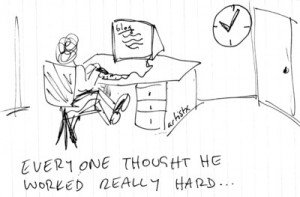“Influencers Who Inspire” – Interview with Steve Barrett, US Editor-In-Chief, PRWeek
PerkettPR is excited to share our latest interview with Steve Barrett who leads the US edition of PRWeek, a premier PR publication. Steve Barrett has been editor-in-chief of PRWeek US since April 2010, managing a team of 12 journalists. PRWeek is the premier global media brand for the communications and PR industries, publishing monthly in print, a weekly online edition, daily online news briefings, weekly sector bulletins, audio, video, blogs, and other regular digital content. Steve shares insight on his role as editor-in-chief of a busy publication, how he transitioned to the US from the UK and how much he loves the city of New York.
Tell us a bit about what your role encompasses as editor-in-chief of PRWeek US?
The editor-in-chief’s role on PRWeek is to lead the brand across all its content platforms, live events, brand extensions, and partnerships. It involves leading and managing a team of journalists and liaising with many departments internally at our holding company Haymarket, including the regional global branches of PRWeek, in the UK and Asia. It also means being the front person for the brand and building great contacts in the industry we cover, across the client, agency, media, and products and services categories. It means being generally supportive of the PR industry, while also challenging it to excel and update its practice, and helping it to advance.
You have been with PRWeek US for over 5 years now. What is the biggest lesson you have learned?
Having transitioned over to the US office of our holding company Haymarket Media from England, I quickly learned that you have to adapt your strategy and style to the local market in which you are operating, without losing the universal skills and experience you have in your locker.
Nobody is interested in hearing about “how you used to do things in the old country,” just as an American in England would get similarly short shrift if they approached the job in such a fashion. That doesn’t mean you can’t offer fresh perspectives and ideas, you just have to present them in the right way.
I also had to tone down my newsroom style a little in the US, as it is generally more “robust” in the UK and certain things don’t go down well here. In the UK you can be in a shouting match with someone one minute and having a pint in the pub with them the next.
However, I was pleased to see the generally high regard in which the media is held in the US and the voracious appetite for quality content. I also learned that over here “The Times” means The New York Times and not The London Times.
What do you find most challenging as editor?
It’s the most exciting time to be in media, but also the most frightening. The landscape is evolving so fast and traditional business models and ways of doing things are changing every day. Standing still is going backwards, so you have to constantly try to infuse your brand and your team with the energy to move forward. That has always been the case by the way, but it is even more so now.
Having come from the UK, what do you miss about it? What do you love about NY?
I miss silly things like roast beef and Yorkshire pudding, proper fish and chips, The Grand National (England’s most famous horse race), good-quality lamb (you can tell I am not a vegetarian), a pint of good bitter, cynicism, and other such English specialties.
New York is the most amazing city in the world. Unlike London, it is a genuine 24-hour city that never sleeps. And, also unlike London, it is a place where people actually live in the center of the city, which makes it super-vibrant and exciting. London has so totally out-priced its native population that it becomes a ghost town in the evenings because nobody can afford to live in the center, and that has had a seriously diminishing effect on my hometown, which I regret. Don’t get me wrong, Manhattan is an expensive place to live, but people have not been completely priced out of the center yet.
If you had not taken the path of journalism for your career, what do you envision you would be doing?
Actually, I came to journalism quite late, having worked in sales, marketing, and at a digital agency before taking a year out, doing a masters degree in journalism, and landing at Haymarket soon after, in 1999, where I have been ever since in various roles.
Funnily enough, despite the traditional tension between editorial and commercial departments on media outlets, in my view some of the skills required are very similar across both – such as the ability to listen, ask open questions, build relationships, negotiate, and go in hard where necessary.
How does PRWeek do such a good job of reporting on timely topics?
Between our US, UK, and Asian editorial operations we have full 24/7 coverage of the PR and communications sectors and we work together very effectively as a team. This is a tribute to the senior and section editors in each region, who have totally bought in to the new global imperative of business. Our journalists are all experts in their beats and tenacious and intelligent in the way they go about their jobs.
We have also stopped thinking about channels and concentrate on content, which is then delivered in the most effective fashion across the most relevant platforms, whether that be mobile (which it increasingly is), online, face to face at events, or in print.
Biggest pet peeve with PR people?
I am in the interesting position of editing the trade publication for PR professionals, so I’m not going to wheel out the usual journalistic gripes about PR people.
The PR profession gets a bad rep from many quarters, including mainstream media outlets such as The New York Times and niche publications such as Advertising Age. Our job at PRWeek is to reflect the transformation going on in PR that makes it fundamental to businesses and organizations of all types and much more respected and valued than it used to be by C-suite level executives.
What keeps you up at night?
When I have a gym session in the morning I always wake up early, which is really annoying. But if I waited until the evening to go to the gym I would never get in there.
I started worrying about geopolitics, war, poverty, terrorism, and the general unsettled state of the world, but I got too depressed, so now I try and think about nice things.
What are you passionate about outside of work? Favorite sport?
As an Englishman born and bred, football is my sport – or soccer as you call it over here. I’ve been a passionate Manchester United fan almost since birth and their results still have far too much of an impact on my mood and disposition.
My other sporting passion is chess – yes, it is a sport. I recently played for my English club team in the European Club Cup in Macedonia and managed to pull off my best win ever, against a strong Azerbaijani Grandmaster. I also love cricket, horseracing, snooker, and boxing.
Apart from sport, I love many types of music, including northern soul, reggae, jazz, ska, and, as I was a teenager in the late-70s, punk. And, I love New York City.
What is next for you for the remainder of 2015?
I have just taken on an additional role at PRWeek as global editorial director, in addition to my duties as EIC of PRWeek US, so my brief has been widened to oversee the development of PRWeek’s collaborative, global editorial products, and to pursue opportunities and partnerships to bring the brand to new regions.





 This week we are happy to share our latest interview with Dan Rowinski, Mobile Editor at
This week we are happy to share our latest interview with Dan Rowinski, Mobile Editor at 

